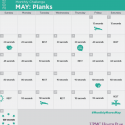Can Exercise Make Me Sick?
It is a well-known fact that physical activity can provide long-term health benefits to anyone. Regular exercise helps expend energy you store from eating throughout the day. It can be as easy as walking the dog or as challenging as running a marathon. Besides managing your weight, regular exercise can produce other health benefits such as:
- Preventing chronic diseases (such as heart disease, diabetes, cancer, stroke).
- Improving and maintaining strength and endurance.
- Promoting strong bones, muscles, and joints.
- Conditioning your heart and lungs.
- Improving sleep and emotional health.
- Relieving stress.
- Increasing energy and self-esteem.
However, there has been a longstanding debate and mixed research on exercise and the immune system. Let’s take a look…
The latest research
Common knowledge holds that competing in endurance sports, such as a marathon, suppresses the body’s immune system and makes a person more susceptible to infections. But researchers in the Department of Health at theUniversity of Bath recently overturned that myth. Their new article, published in the journal Frontiers in Immunology, reinterprets scientific findings from the past few decades and emphasizes that exercise may instead improve immune health rather than dampen it.
The confusion stems from how exercise causes immune cells to change; during exercise, the number of some immune cells in the bloodstream can increase dramatically (by up to 10 times). These cells are the “natural killer cells” that fight infections, but after exercise some cells in the blood stream decrease significantly—falling to levels lower than before exercise started. And this effect can last for several hours. Previously, many scientists interpreted this drop-off of immune cells after exercise as evidence that exercise suppresses the immune system. However, strong evidence now suggests that the decrease in immune cells does not mean the cells have been lost or destroyed. Instead, they move to other sites in the body that are more prone to infection, such as the lungs.
Scientists now know that immune cells are not destroyed for three main reasons:
- Evidence shows the cells return to normal levels within several hours. That’s not enough time for them to be “replaced” with new cells.
- Studies in humans have shown these cells can leave the bloodstream and travel to other parts of the body.
- Studies with laboratory animals whose immune cells were labeled showed that after exercise, the labeled immune cells accumulated in the lungs and other vulnerable places. Essentially, they were seeking infections to fight.
The new findings suggest that low numbers of immune cells in the bloodstream in the hours after exercise are not a sign of immune suppression.In fact, it’s a sign that these cells are primed by exercise and are working in other parts of the body.
- One study in the American Journal of Medicine found that women who walked for 30 minutes every day for one year had half the number of colds as those who didn’t exercise. Researchers found that regular walking may lead to a higher number of white blood cells, which fight infections.
- In another study, researchers found that in 65-year-olds who did regular exercise, the number of T-cells—a specific type of white blood cell—was as high as those of people in their 30s.
Regular exercise is one of the pillars of healthy living.Just like a healthy diet, exercise can contribute to general good health and therefore to a healthy immune system. It may provide benefits even more directly by promoting good circulation, which allows the cells and substances of the immune system to move easily through the body and do their job efficiently.
Too much of a good thing: Over-exercising
Some scientists have taken the next step to determine whether exercise directly affects a person’s susceptibility to infection by looking at how extreme amounts of intensive exercise can cause individuals to get sick more often or somehow impairs their immune function. Although regular exercise is beneficial for the body, chronic excessive and exhausting exercise along with lack of rest and recovery between exercise sessions can cause negative stress on the body and contribute to a negative immune response.
Overtraining or over-exercising can harm a person’s neurological, endocrine, and immune systems. This can lead to mood and anxiety disorders, depression, general apathy, emotional instability, loss of appetite, sleep disorders, hormonal changes, increased heart rate at rest, and an increased vulnerability to infection and injury. The state of physical and mental exhaustion doesn’t just impair performance, it can be detrimental to a person’s health.
About 80 percent of U.S. adults and adolescents are not as physically active as they should be for overall health. Lack of physical activity is a common concern for people in public health fields, but they should give equally serious consideration to over-exercising. Finding the balance between exercise and rest is a poorly understood process and differs from person to person.
The difference between exercise as medicine and exercise as poison is the dose.
How much exercise should I do to improve my immune system?
The 2018 Physical Activity Guidelines Advisory Committee recommends:
- Preschool-aged children (3-5 years old) should be physically active throughout the day.
- Children and adolescents (6-17 years old)should get 60 minutes or more of moderate-to-vigorous physical activity daily.
- Adults(18-65 years old) should do at least 150-300 minutes a week of moderate-intensity exercise, or 75-150 minutes a week of vigorous-intensity aerobic physical activity (or a combination of the two) and do muscle-strengthening activities on 2two or more days per week.
- Older adults(65+ years old) should do multicomponent physical activity that includes balance, aerobic, and muscle-strengthening activities.
- Pregnant and postpartum women should do at least 150 minutes of moderate intensity aerobic activity a week.
- Adults with chronic conditions or disabilities, who are able, should follow the key guidelines for adults and do both aerobic and muscle-strengthening activities.
Of course, there is no perfect equation for how much exercise and rest to have for everyone. Some people are new to exercise and some have been exercising regularly for decades. When it comes to intense, exhausting exercise, it is important to listen to your body and take appropriate time to rest and recover.
How else can I improve my immune system?
In the big picture, your immune system does a remarkable job of defending you against disease-causing microorganisms. Sure, sometimes a germ invades and makes you sick—but it’s possible to boost your body’s immune system and help it win more often. Choosing a healthy lifestyle to support your immune system is the single best step to take toward naturally keeping it strong and healthy.
Some of these healthy-living strategies include:
- Eating a diet high in fruits and vegetables.
- Not smoking or using tobacco products.
- Exercising regularly.
- Maintaining a healthy weight.
- Drinking alcohol only in moderation or not atall.
- Getting enough sleep.
- Taking steps to avoid infection (proper hand washing and cooking meats thoroughly).
- Practicing stress management.
See also:
References:



